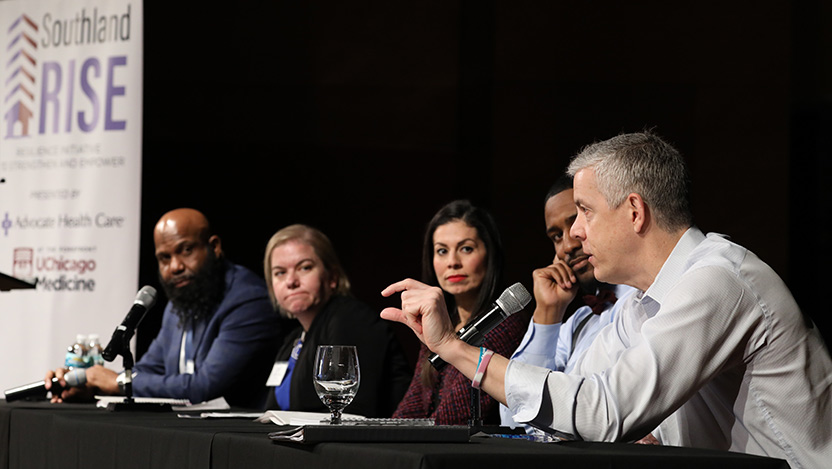Community summit brings together Chicagoland leaders seeking solutions to effects of violence and trauma

Mayor Lori Lightfoot delivered the opening remarks at Southland RISE's inaugural summit, highlighting the city’s commitment to reducing gun violence and supporting efforts promoting trauma recovery.
What are the effects of violence and trauma on Southland communities? How can larger institutions and grassroots organizations effectively collaborate to address the effects of trauma on individual and community health? What are some of the best practices being used to help communities recover from the effects of trauma?
To address these questions and others, Southland RISE (Resilience Initiative to Strengthen and Empower), a collaboration powered by the University of Chicago Medicine and Advocate Heath Care, hosted the all-day summit, Healing to RISE: Fostering Connections to Support Individuals, Families and Communities Impacted by Trauma at the Salvation Army Ray and Joan Kroc Corps Community Center on Chicago’s far South Side. The two health systems launched Southland RISE in 2019 to strengthen and integrate violence recovery and trauma care services throughout the South Side and across the south suburbs.
Mayor Lori Lightfoot delivered the summit’s opening remarks, highlighting the city’s commitment to reducing gun violence and supporting efforts promoting trauma recovery.
By treating violence as the public health crisis that it is, we are able to focus our resources on addressing this challenge in its entirety.
“By treating violence as the public health crisis that it is, we are able to focus our resources on addressing this challenge in its entirety — both the circumstances that create it and the trauma that follows it,” said Mayor Lightfoot. “And, on behalf of our entire city, I want to express my gratitude to leading institutions like the University of Chicago Medicine and Advocate Health Care who are stepping up and doing their part and showing how anchor institutions can play pivotal roles in increasing access to service.”
The summit drew close to 200 state, local, community and academic leaders, including representatives of social service organizations, city agencies, healthcare providers, community organizations and the faith community.

“Residents of our South Side communities have identified violence prevention and trauma resiliency as a top health priority, and it’s imperative that healthcare leaders consider all voices and viable solutions to address this disparity,” said Brenda Battle, vice president of UChicago Medicine’s Urban Health Initiative and the medical center’s chief diversity and inclusion officer. “Through this summit, Southland RISE hopes to amplify a critical discussion surrounding violence and trauma that can help us better understand what’s working and what’s missing as we seek paths to healing and recovery.”
Southland RISE outlined three key objectives for the summit:
- To create a learning opportunity to explore the impacts of trauma and violence on Southland communities
- To highlight and explore innovative strategies and approaches that communities and multi-sector partners are using to promote recovery, build resilience and decrease the effects of trauma on individual and community health
- To provide a platform for an organized discussion about the strengths and gaps across partners, allowing the group to think about how it can create a “multiplier effect” through more strategic collective action
Using data and perspectives from government agencies and community leaders, the summit’s panel discussions explored the crisis resulting from violence and the effects of trauma on communities, residents and families. Topics then turned toward solutions, including strategies and approaches for building trauma resiliency and safe and just communities. Throughout the event, participants engaged in small-group activities designed to reinforce key concepts, identify potential obstacles and generate discussion and ideas for effective collaboration needed to achieve shared goals.
Residents of our South Side communities have identified violence prevention and trauma resiliency as a top health priority.
Southland RISE is the result of Chicago HEAL — Hospital Engagement, Action and Leadership — an initiative launched by U.S. Senator Dick Durbin in October 2018 to urge healthcare providers on the city’s South and West Sides to bolster their efforts to help reduce violence and address healthcare needs associated with violence recovery.
“We chose to partner with U.S. Senator Dick Durbin and UChicago Medicine to create Southland RISE, because we knew that a comprehensive solution was needed to address the violence that plagues our community,” said Matt Primack, president of Advocate Condell Medical Center and the violence prevention lead for Advocate Health Care. “We understand that violence needs to be addressed through a three-pronged approach of prevention, intervention and trauma-informed treatment. By creating a network with our community partners who currently provide those services, we can ultimately expand programs and our overall capacity to better meet the needs of the community.”
The summit represents one of five key objectives Southland RISE committed to achieving during the collaborative’s first two years. Other priorities include aligning and integrating trauma care services across organizations, developing trauma-informed care training models and awarding grant funding for community-based violence recovery and prevention programs.
